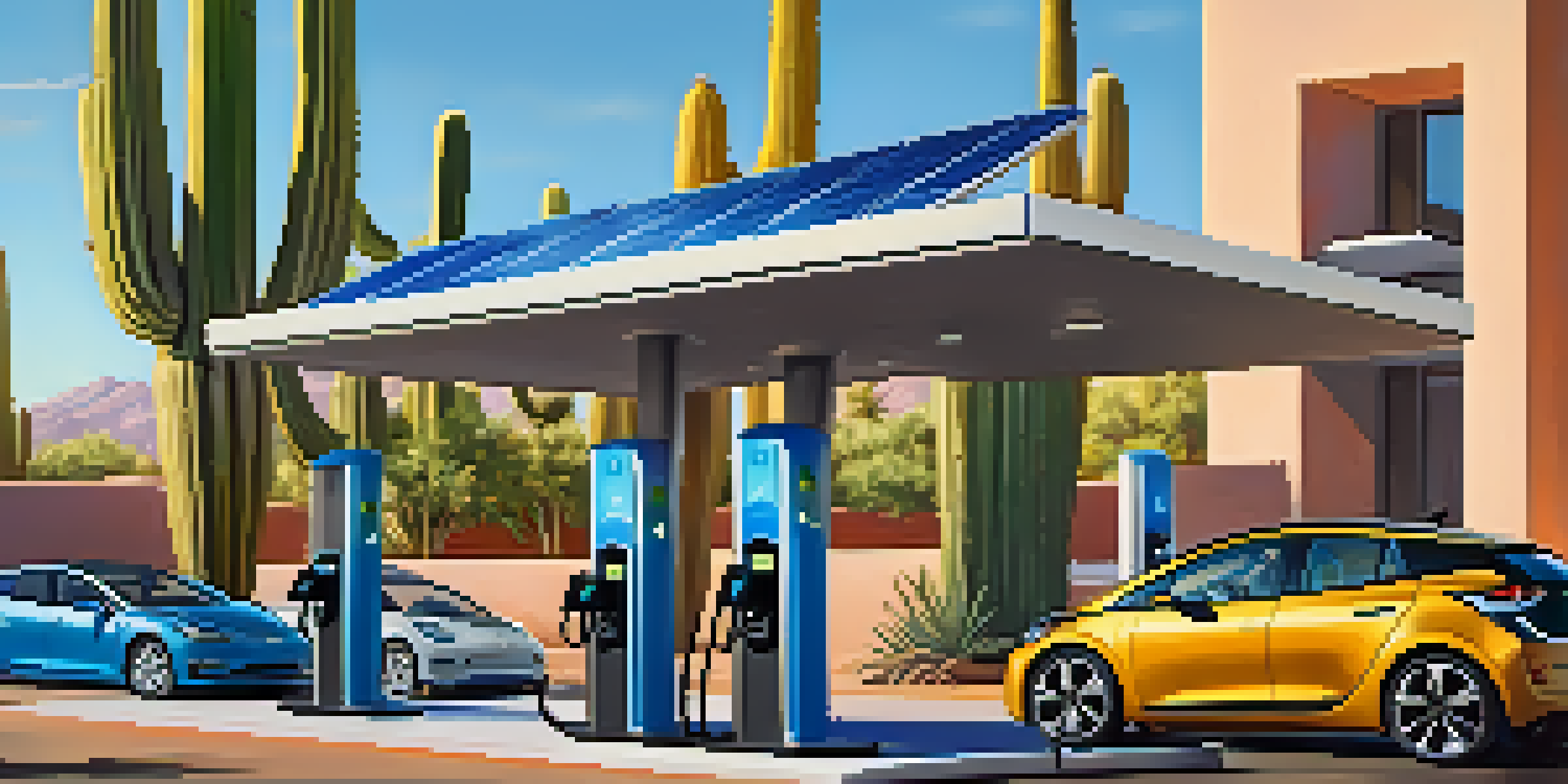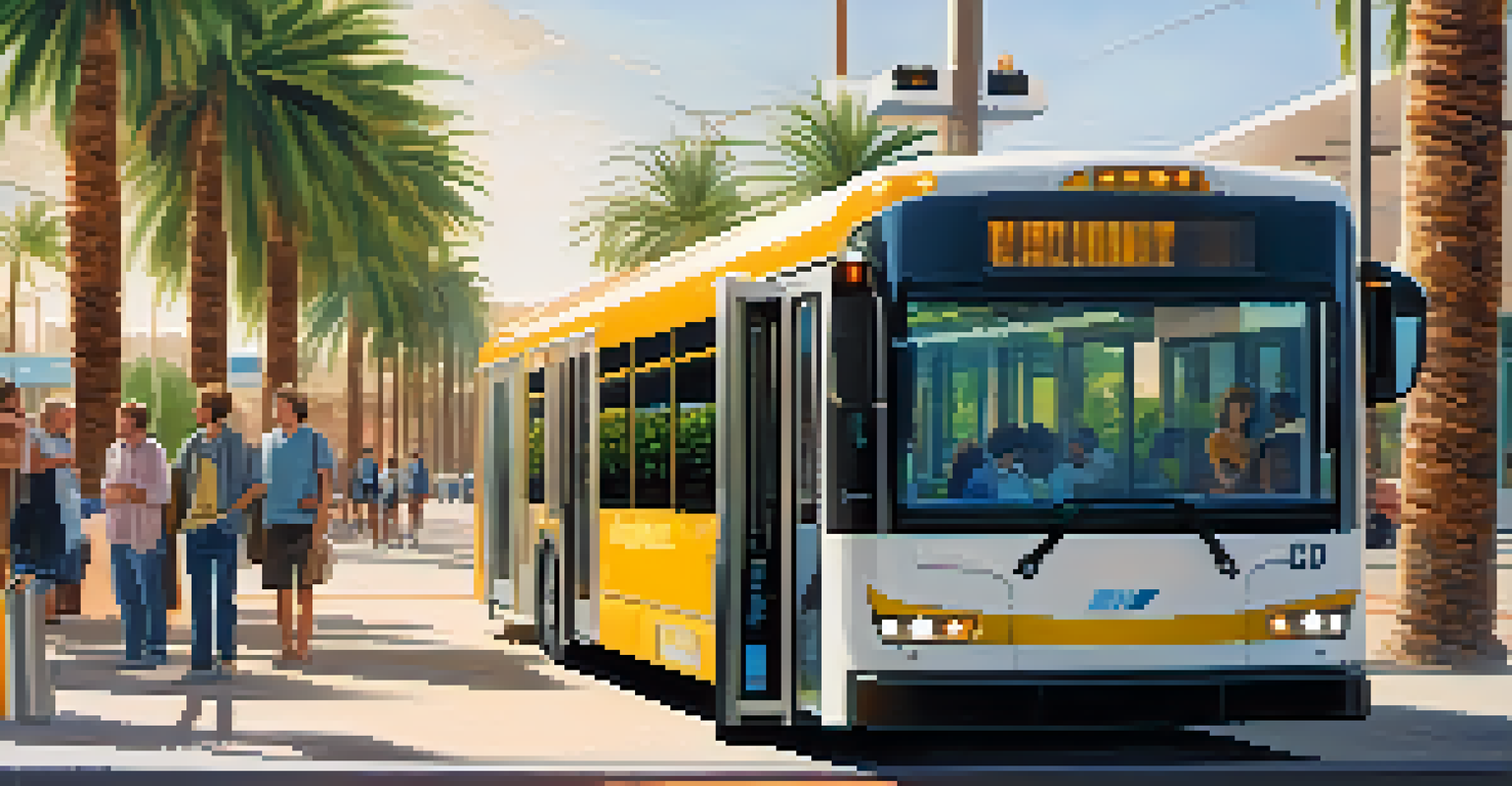Sustainable Transportation Solutions Emerging in Arizona

The Rise of Electric Vehicles in Arizona
Arizona is witnessing a significant surge in electric vehicle (EV) adoption, driven by both environmental concerns and technological advancements. With an increasing number of charging stations popping up across the state, residents are finding it easier to go electric. Additionally, incentives from local governments and utilities have made EVs more financially attractive, encouraging more people to make the switch. This shift not only reduces emissions but also captures a growing market of eco-conscious consumers.
The future is electric. The future is sustainable.
Moreover, Arizona's sunny climate is a natural fit for solar-powered EV charging stations. Many businesses and homeowners are investing in solar panels that can power their electric cars, making the transition even more sustainable. The synergy between renewable energy and electric vehicles creates a virtuous cycle that benefits both the environment and the economy. As more people embrace this change, the landscape of transportation in Arizona is evolving rapidly.
The state's commitment to infrastructure improvements has also played a crucial role in supporting this electric revolution. Arizona's Department of Transportation is actively working to expand the network of EV charging stations, ensuring that drivers have access to the resources they need. As technology continues to improve and awareness grows, the electric vehicle market in Arizona is poised for remarkable growth.
Public Transit Innovations for Sustainability
Arizona is enhancing its public transportation systems to reduce dependence on personal vehicles and lower carbon footprints. Cities like Phoenix and Tucson are integrating electric buses, which not only cut down on emissions but also offer a quieter ride for passengers. These electric buses represent a forward-thinking approach to urban mobility, ensuring that public transport is both efficient and environmentally friendly.

In addition to electric buses, Arizona is investing in smart transit solutions that utilize technology to improve service. Apps that provide real-time tracking of buses and trains help commuters plan their journeys more effectively, reducing wait times and increasing ridership. This convenience encourages more people to choose public transit over driving, which is a crucial step toward sustainability.
Surge in Electric Vehicle Adoption
Arizona's electric vehicle adoption is fueled by environmental concerns, technological advancements, and increased charging infrastructure.
Furthermore, partnerships between local governments and private companies are fostering innovation in public transit. These collaborations can lead to pilot programs for on-demand shuttle services and bike-sharing initiatives, which can help bridge the gap between traditional public transport and personal mobility options. As these innovations unfold, Arizona's public transportation landscape is becoming more appealing and sustainable.
Biking Infrastructure Improvements
Biking is becoming increasingly popular in Arizona, thanks in part to the state’s efforts to improve cycling infrastructure. Cities are investing in dedicated bike lanes and multi-use pathways, making it safer and more enjoyable for cyclists to navigate urban areas. These improvements not only promote cycling as a sustainable mode of transportation but also encourage a healthier lifestyle.
Sustainability is about how we live and work together today while ensuring future generations can thrive.
Moreover, bike-sharing programs are emerging in various cities, allowing residents and visitors to rent bikes easily. This accessibility removes barriers to entry for those who may not own a bike or be willing to invest in one. By providing convenient and affordable options, these programs are fostering a vibrant cycling community and reducing the reliance on cars.
As Arizona continues to enhance its biking infrastructure, the benefits extend beyond just transportation. Improved biking facilities can lead to reduced traffic congestion, lower pollution levels, and increased physical fitness among the population. The growing emphasis on cycling reflects a broader commitment to sustainability and community well-being.
Carpooling and Ridesharing Trends
Carpooling and ridesharing are gaining traction as effective sustainable transportation solutions in Arizona. With the state’s sprawling geography, these options offer a way to maximize vehicle use while reducing the number of cars on the road. Programs that promote carpooling and ridesharing not only help reduce traffic congestion but also decrease greenhouse gas emissions significantly.
Technology plays a pivotal role in facilitating these trends, with numerous apps available to connect drivers and riders. These platforms make it easier than ever for individuals to share rides, turning an everyday commute into a more sustainable practice. As more people become aware of these services, the potential for reducing single-occupancy vehicles on the road increases dramatically.
Innovations in Public Transit
Cities in Arizona are enhancing public transportation with electric buses and smart tracking solutions to promote sustainable commuting.
Additionally, local initiatives are encouraging carpooling through incentives such as preferred parking spots for carpoolers and discounts on tolls. This collaborative approach fosters a sense of community among commuters and highlights the benefits of shared transportation. As these trends continue to grow, Arizona is set to make strides toward a more sustainable transportation future.
Innovative Solutions for Last-Mile Connectivity
Last-mile connectivity is a crucial component in the quest for sustainable transportation, and Arizona is actively seeking innovative solutions. As public transit systems expand, the challenge of getting passengers from transit hubs to their final destinations remains. To tackle this issue, cities are exploring options like electric scooters and bike-sharing programs that can seamlessly connect commuters to public transportation.
These last-mile solutions not only enhance convenience but also promote the use of public transit as a viable option for daily commutes. By making it easier to complete the journey, more people are likely to opt for public transportation over personal vehicles. This shift can lead to a significant reduction in traffic congestion and emissions in urban areas.
Furthermore, partnerships with tech companies are leading to the development of integrated mobility apps that provide users with multiple transportation options in one platform. These apps can help users plan their trips efficiently, combining public transit, biking, and ridesharing into a single journey. As Arizona continues to innovate in this area, last-mile connectivity will play a pivotal role in achieving sustainable transportation goals.
Sustainable Freight Transportation Initiatives
Sustainable transportation in Arizona isn't just about personal vehicles; freight transportation is also undergoing significant changes. With the growth of e-commerce, the need for efficient and sustainable freight solutions has never been more critical. Arizona is embracing innovative logistics strategies, including the use of electric and hybrid trucks for deliveries, reducing emissions associated with freight transport.
Moreover, the state is investing in infrastructure that supports sustainable freight movement, such as designated lanes for electric delivery vehicles and improved multimodal hubs. These enhancements facilitate smoother transitions between different transportation modes, promoting a more efficient supply chain. As businesses adopt these sustainable practices, they not only contribute to environmental goals but also enhance their operational efficiency.
Community Engagement Drives Change
Active community involvement is crucial for promoting sustainable transportation practices and addressing local needs in Arizona.
Additionally, collaboration between government agencies and the private sector is essential for advancing sustainable freight initiatives. By working together, stakeholders can develop policies and incentives that encourage the adoption of green technologies in logistics. As Arizona continues to prioritize sustainable freight transportation, the state is poised to become a leader in innovative supply chain solutions.
Community Engagement in Sustainable Practices
Community engagement is vital for the success of sustainable transportation initiatives in Arizona. Local organizations and advocacy groups are actively working to raise awareness about the benefits of sustainable transport options. Through educational campaigns and events, they encourage residents to embrace practices like biking, carpooling, and using public transit.
Moreover, community involvement can lead to the development of grassroots programs that address local transportation needs. These initiatives often focus on creating safe and accessible routes for pedestrians and cyclists, reflecting the unique challenges faced by each community. By putting residents at the forefront of the conversation, these efforts foster a sense of ownership and responsibility toward sustainable transportation.

As more Arizonans become engaged in sustainability efforts, the collective impact can be significant. Communities that prioritize eco-friendly transportation not only contribute to a healthier environment but also enhance their quality of life. The collaboration between residents, local governments, and organizations is essential in shaping a sustainable transportation future for Arizona.